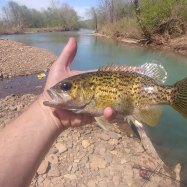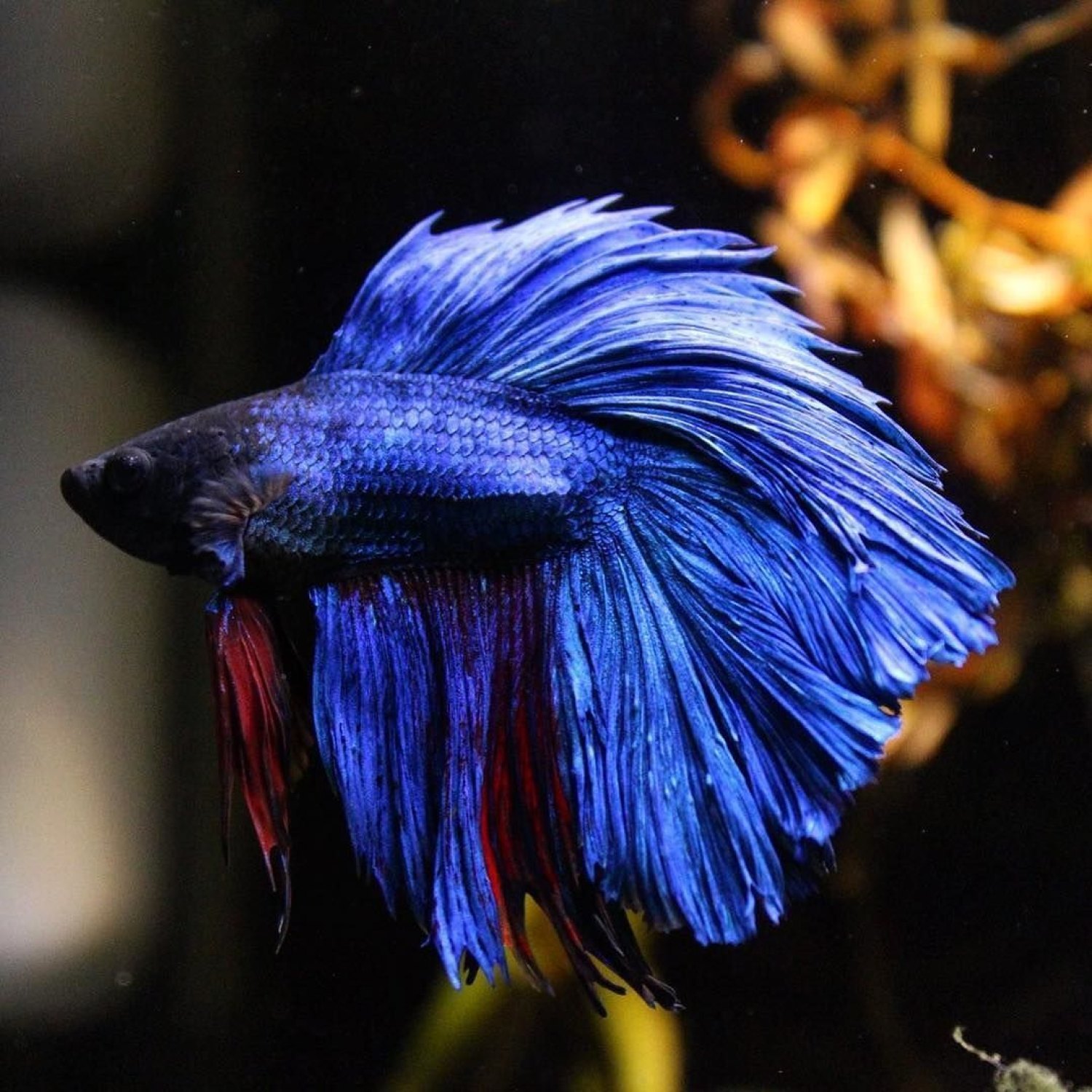
Betta Fish
Up to 3 inches (7.6 cm)
Did you know that Betta Fish, also known as Siamese Fighting Fish, can grow up to 3 inches long? They are commonly found in tropical rice paddies and shallow freshwater plains. These small but feisty creatures belong to the Osphronemidae family and have a slender, elongated body shape. Betta Fish are a popular choice for aquariums due to their vibrant colors and unique personalities. #BettaFish #AnimalFacts #AquariumPets
Animal Details Summary:
Common Name: Betta Fish
Kingdom: Animalia
Habitat: Freshwater
Betta Fish: A Colorful and Fascinating Aquatic Creature
When you think of a fish, the image that comes to mind might be a small, goldfish swimming in a round bowl. However, there is one species of fish that stands out with its vibrant colors, unique personality, and captivating traits - the Betta fish (Betta splendens).Also known as Siamese fighting fish, the Betta fish has been a popular choice for pet owners and fish enthusiasts for many years. Its stunning appearance, low maintenance needs, and interesting behavior make it a top pick for both beginner and expert fishkeepers Betta Fish. So, let's dive deeper into the world of Betta fish and discover what makes them so special.
The Basics: Scientific Classification
Before we explore the Betta fish's characteristics, let's first understand its scientific classification. The Betta fish belongs to the animal kingdom (Animalia) and is classified under the chordata phylum. It is a member of the actinopterygii class, which includes all bony fish species. Within this class, the Betta fish falls under the order Perciformes, which includes more than 10,000 species of fish. Finally, it belongs to the Osphronemidae family, which includes other species of fish such as gouramis and paradise fish.Origins and Habitat
The Betta fish is native to Southeast Asia, specifically Thailand. These colorful creatures are commonly found in tropical rice paddies and shallow freshwater plains in this region. However, due to their popularity as pets, they have been introduced to other countries such as Malaysia, Indonesia, and Vietnam Boxer Mix.In the wild, Betta fish live in shallow, slow-moving waters with low oxygen levels and dense vegetation. This habitat is crucial for their survival, as they use the plants for shelter and for building bubble nests. Unlike other fish species, Betta fish are not strong swimmers and prefer to stay near the surface of the water.
The Colorful World of Betta Fish
One of the most striking features of the Betta fish is its vibrant and diverse colors. Unlike other fish species, Betta fish have a wide range of colors and patterns, making each one unique and beautiful in its own way. Some of the colors you can find in Betta fish include red, blue, green, purple, and even metallic shades.But did you know that the colors of Betta fish are not only for aesthetic purposes? These colors actually serve as a form of communication and can indicate the fish's mood and health. For example, a dark coloration may indicate stress, while a bright and vibrant color can signify a happy and healthy fish.
The Betta Fish Diet
As carnivorous fish, Betta fish have a diet mainly consisting of small insects and larvae. In the wild, they are known to feed on mosquito larvae, bloodworms, and small crustaceans. In captivity, pet owners can provide them with a variety of food such as pellets, flakes, and freeze-dried bloodworms.It is important to note that overfeeding Betta fish can lead to health problems such as obesity and swim bladder issues. Therefore, it is recommended to feed them small amounts of food twice a day, rather than one large meal.
The Betta Fish: A Unique Personality
Apart from their striking appearance, Betta fish are also known for their interesting behavior and personality. Unlike other fish species, Betta fish are not schooling fish and prefer to be alone. In fact, they are known to be aggressive towards other Betta fish, especially males.This aggressive behavior is where the term "Siamese fighting fish" comes from. In the wild, male Betta fish will fight each other for territory and to attract females. However, in captivity, they are usually kept separate from other fish to prevent this kind of behavior.
Despite their aggression towards other fish, Betta fish can form a strong bond with their owners. Many pet owners have reported their Betta fish recognizing their voice and even "greeting" them when they approach their tank. They are also known to be curious and can be trained to perform simple tricks.
The Care of Betta Fish
One of the reasons why Betta fish make great pets is due to their low maintenance needs. However, this does not mean they do not require proper care and attention. Here are a few essential things to consider when caring for a Betta fish:- Tank size: While Betta fish can survive in small containers such as bowls, they thrive in larger tanks with a minimum of 5 gallons of water. This will give them enough space to swim and explore, and also maintain water quality.
- Water conditions: As Betta fish are native to warm tropical waters, they require a water temperature between 75-82 degrees Fahrenheit. The water should also be slightly acidic, with a pH level between 6.5-7.5
- Filtration: A filtration system is necessary to maintain water quality and prevent the buildup of harmful toxins. However, make sure the filter does not create strong water currents, as Betta fish prefer still waters.
- Decoration: As mentioned earlier, Betta fish use plants for shelter and to build bubble nests. Therefore, it is essential to provide them with live or silk plants in their tank. However, avoid using plastic plants as they can tear the Betta's delicate fins.
- Tankmates: If you plan on keeping other fish in the tank with your Betta fish, make sure to do your research beforehand. Not all fish species are compatible with Betta fish, and some may even become aggressive towards them.
In Conclusion
In summary, the Betta fish is a fascinating and unique aquatic creature that has captured the hearts of pet owners all over the world. From its vibrant colors and distinct personality to its low maintenance needs and interesting behavior, it is no wonder why this fish has become so popular. If you are looking for an eye-catching and easy-to-care-for fish, the Betta fish might just be the perfect choice for you. So, why not add a splash of color and life to your home with one of these beautiful fish?

Betta Fish
Animal Details Betta Fish - Scientific Name: Betta splendens
- Category: Animals B
- Scientific Name: Betta splendens
- Common Name: Betta Fish
- Kingdom: Animalia
- Phylum: Chordata
- Class: Actinopterygii
- Order: Perciformes
- Family: Osphronemidae
- Habitat: Freshwater
- Feeding Method: Carnivorous
- Geographical Distribution: Southeast Asia
- Country of Origin: Thailand
- Location: Tropical rice paddies and shallow freshwater plains
- Animal Coloration: Vibrant colors (varies depending on species and selective breeding)
- Body Shape: Slender and elongated
- Length: Up to 3 inches (7.6 cm)
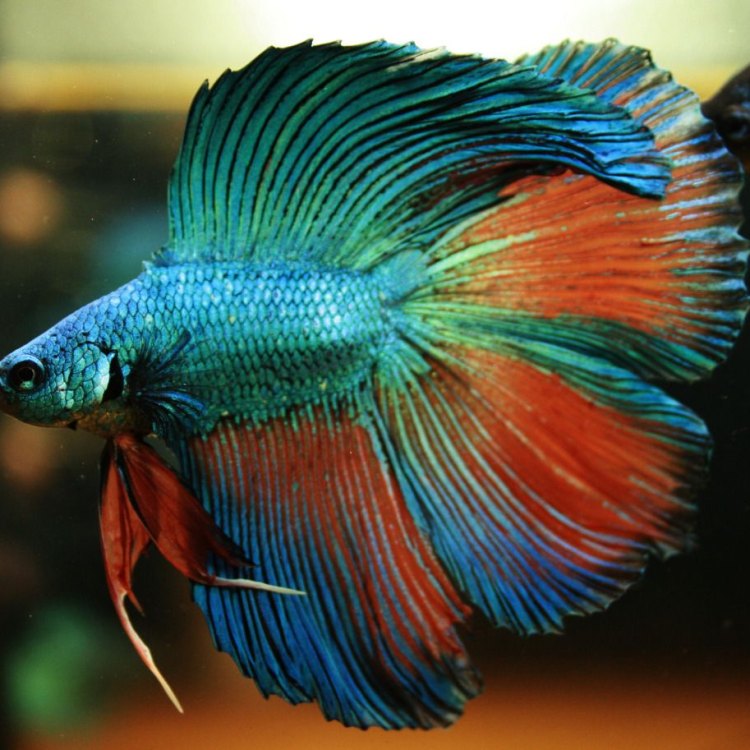
Betta Fish
- Adult Size: Up to 3 inches (7.6 cm)
- Average Lifespan: 2-4 years
- Reproduction: Sexual
- Reproductive Behavior: Bubble nest builder
- Sound or Call: None
- Migration Pattern: Non-migratory
- Social Groups: Solitary
- Behavior: Aggressive towards other males
- Threats: Habitat loss, water pollution, illegal trade
- Conservation Status: Least Concern
- Impact on Ecosystem: Top predator in its habitat
- Human Use: Popular aquarium fish
- Distinctive Features: Long, flowing fins, labyrinth organ for breathing air
- Interesting Facts: Male bettas are known for their aggressive displays and can be seen flaring their fins and fighting other males.
- Predator: Predatory fish, birds
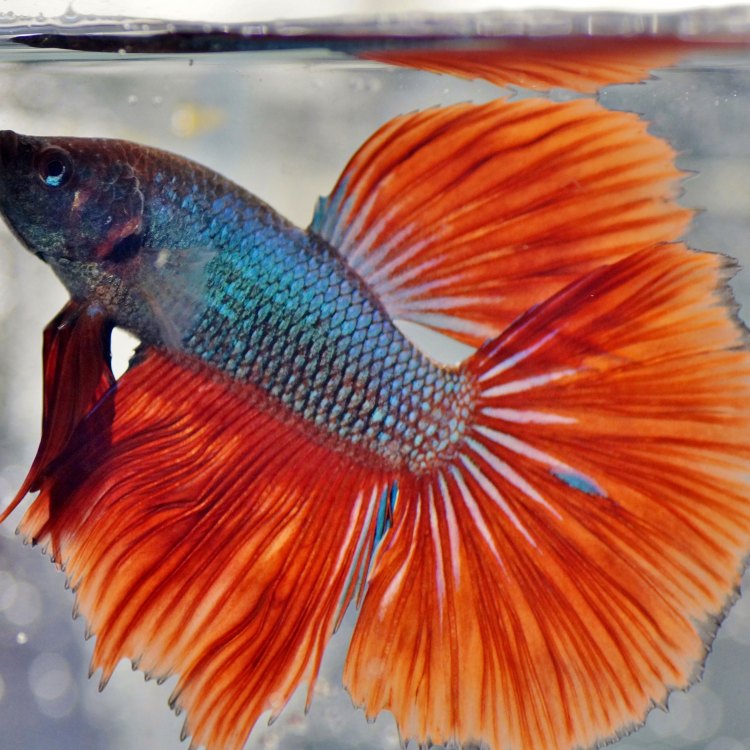
Betta splendens
The Fascinating World of Betta Fish: From Bubble Nest Builders to Top Predators
When it comes to fish, many people think of their colorful scales or mesmerizing movements. But one type of fish stands out for its distinctive features and interesting behaviors - the Betta fish. Also known as Siamese fighting fish, Betta fish have captivated the hearts of fishkeepers and researchers alike.From their unique reproductive behavior to their role in the ecosystem, let's dive into the world of Betta fish and discover why they are more than just your average aquarium fish PeaceOfAnimals.Com.
Adult Size and Average Lifespan
Betta fish, scientifically known as Betta splendens, originate from Southeast Asia, specifically Thailand, Malaysia, and Cambodia. These fish are relatively small, growing up to three inches (7.6 cm) in length when fully matured. This makes them a suitable choice for smaller aquariums.
In terms of lifespan, Betta fish can live for around 2-4 years, depending on how well they are cared for. With proper nutrition, clean water, and a suitable living environment, they can potentially live longer. However, compared to other fish species, this is a relatively short lifespan, making each moment with these fish even more cherished.
Reproduction and Bubble Nest Builders
Betta fish have a unique reproductive behavior compared to other fish species. They are sexual reproducers, meaning they require both a male and a female in order to reproduce Baya. When ready to mate, the male builds a bubble nest on the surface of the water using air bubbles and saliva. This behavior is known as bubble nest building.
The female then lays her eggs, and the male fertilizes them and places them in the bubble nest for protection. This behavior is a crucial element for the survival of the species since it allows the eggs to develop safely away from potential predators.
Sound or Call: None
Unlike other fish species, Betta fish do not produce any sounds or calls. Instead, they use visual cues and body movements to communicate with one another. This is especially evident during breeding when males display their vibrant colors and flare their fins as a way to intimidate other males and attract females.
Non-migratory and Solitary Social Groups
Betta fish are non-migratory, meaning they do not travel long distances in search of food or breeding grounds. They are also solitary creatures, preferring to live alone and defend their territory. In the wild, you will typically find them living in small ponds or streams, where they fiercely protect their space.
This solitary nature also extends to their human caregivers, as Betta fish are not known to be social with humans. Therefore, it is best to keep them as the sole fish in an aquarium, unless your fishkeeper skills are advanced enough to carefully introduce tankmates.
Aggressive Behavior towards Other Males
While Betta fish have a peaceful nature towards other species, they are known for their aggressive behavior towards their own kind. In the wild, males will fight to establish dominance and protect their territory. This aggressive behavior is also apparent in male Betta fish kept as pets, and they can exhibit signs of aggression even towards their reflections in a mirror.
Threats, Conservation Status, and Impact on the Ecosystem
Unfortunately, Betta fish face various threats to their survival. Habitat loss, water pollution, and illegal trade for the pet industry are just a few of the challenges they face. These threats have resulted in the International Union for Conservation of Nature (IUCN) categorizing Betta fish as "Least Concern" on the conservation status scale. However, this does not mean that their protection should be ignored, as continued efforts are necessary to ensure their survival in the wild.
In their natural habitat, Betta fish play a crucial role as top predators. They help control the insect population in the water bodies they reside in, making them an essential part of the ecosystem. The loss of these fish would have a ripple effect on the balance of the ecosystem, highlighting the need to conserve their population.
Human Use and Popular Aquarium Fish
Betta fish have been popular as aquarium fish for centuries, with their first documented use as a domesticated fish in Thailand in the 1800s. Their vibrant colors, long, flowing fins, and easy maintenance make them a top choice for fishkeepers. However, their popularity also puts them at risk, as they are often bred for their color and fin shape, leading to potential health issues and deformities.
Distinctive Features and Labyrinth Organ
One of the most distinctive features of Betta fish is their long, flowing fins. These fins, often compared to a peacock's tail, come in a variety of colors and patterns. They serve as a way for males to display their dominance and attract females during the breeding process.
Another unique feature of Betta fish is their labyrinth organ, which allows them to breathe air from the surface of the water. This organ is especially beneficial for wild Betta fish living in stagnant or shallow water, as it enables them to survive in areas with low oxygen levels.
Interesting Facts: The Male's Aggressive Displays
Aside from their distinctive features and behaviors, there are many interesting facts about Betta fish that make them stand out from other fish species. Most notably, male Betta fish are known for their aggressive displays and fights with other males. However, this behavior is only seen in fish kept in captivity, as in the wild, they reserve their aggressive behavior for breeding and territorial disputes.
Predators: Predatory Fish and Birds
Despite their aggressive nature, Betta fish have predators in their natural habitat. Predatory fish, such as catfish, may prey on young Betta fish, while larger fish and birds may hunt adult Betta fish. This is another reason for their solitary and territorial behavior, as it helps protect them from potential predators.
In conclusion, Betta fish are more than just beautiful aquarium fish. Their unique reproductive behavior, solitary social groups, and aggressive nature towards other males make them a fascinating species to study. However, their conservation status serves as a reminder that these fish should be appreciated and protected in their natural habitat. As responsible fishkeepers, it is our duty to provide them with a suitable living environment and ensure their survival for future generations to appreciate the beauty of Betta fish.
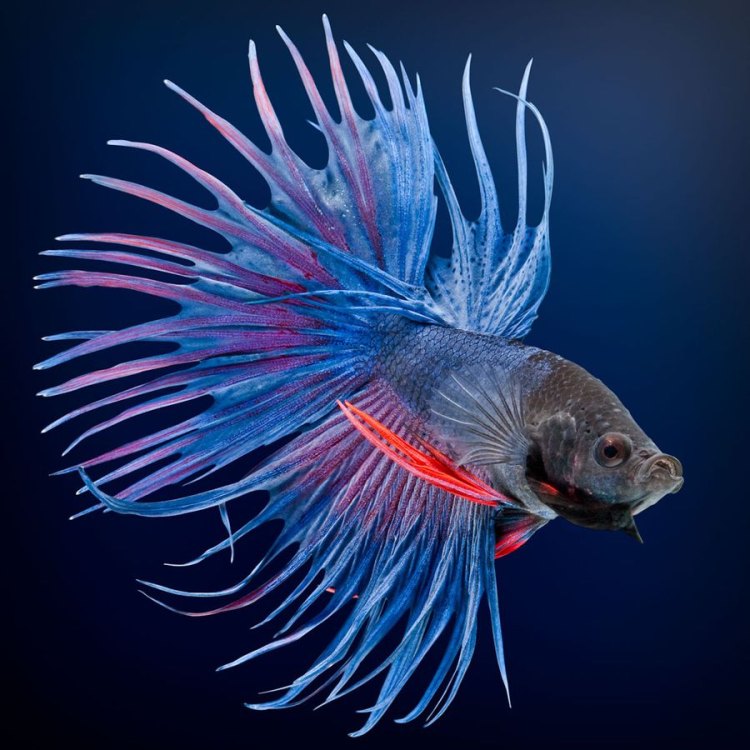
Betta Fish: A Colorful and Fascinating Aquatic Creature
Disclaimer: The content provided is for informational purposes only. We cannot guarantee the accuracy of the information on this page 100%. All information provided here may change without prior notice.











